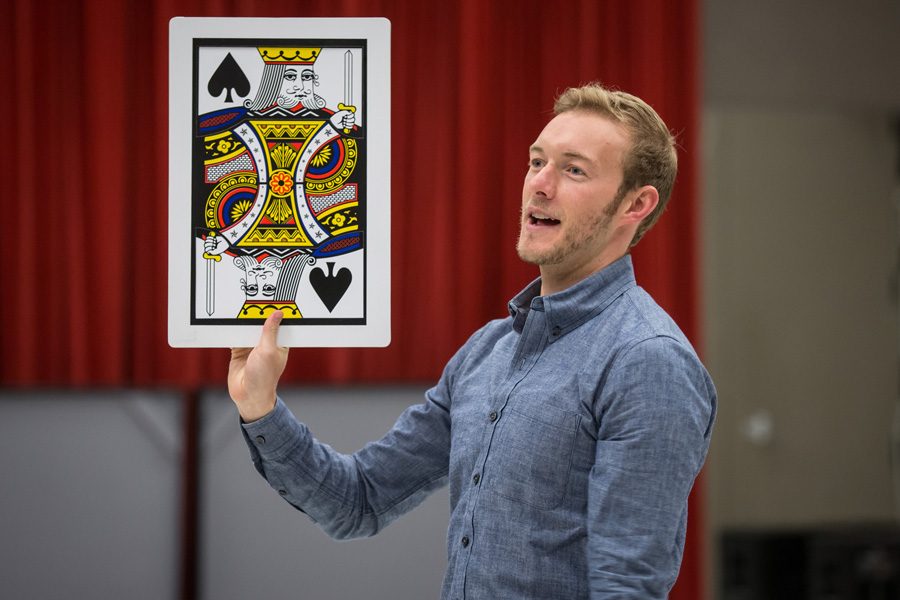NU alumni collaborate on new play telling magician’s tale
Brett Schneider (Communication ‘07) stars as the Magician in the Goodman Theatre’s production of “The Magic Play.” The play began performances Oct. 21 and will run until late November.
October 26, 2016
A&E
A new play featuring the work of two Northwestern alumni is bringing together two different styles of live performance: magic and theater.
“The Magic Play” is the story of the Magician, a young performer who continues to put on magic shows even as his personal life falls apart. The Magician must come to terms with the fact that the deception he uses in his magic tricks is also the source of his ruined relationship.
“In the end, this play is not a magic show. It’s a play. It’s a love story,” said Brett Schneider (Communication ‘07), who plays the protagonist. “The show is about trust and letting your partner see yourself for the entire you and all the imperfections.”
“The Magic Play” opened Friday and will run until Nov. 20 at the Goodman Theatre in Chicago.
Director Halena Kays (Communication ‘96) and Schneider said the show aims to highlight themes of vulnerability and trust. Vulnerability and openness with loved ones is an important, though scary, part of life, Kays said.
“I hope … some things that were unexpected happen in a way that makes (the audience) rethink the way they move through the world and the way that they are present with the people they love,” she said.
Playwright Andrew Hinderaker approached Schneider nearly four years ago and asked him to collaborate on a new play he wanted to write about a magician, Schneider said. He added Hinderaker was familiar with his background as an actor and a magician.
Schneider said he has been performing magic since he was 13 years old.
“He was curious about trying to combine the live performance style of sleight-of-hand magic shows with the live performance element of a narrative play,” Kays said.
Hinderaker developed the play through the Goodman Theatre’s Playwrights Unit, a program the theater founded in 1925 to encourage the production of new plays. He wrote his play based on memories of his uncle, Hinderaker said in a news release.
“I wanted to write about my uncle, who is a talented artist but a dysfunctional, isolated person, and I have always felt I share some of his traits,” he said in the release.
After finishing an early draft of the play, Hinderaker began collaborating with Kays, who went on to direct the production’s first public reading. Kays also directed the show’s first performance at the 11th annual New Stages Festival in 2014.
“We got to put the play on its feet and experiment with some technical stuff and, more importantly, watch the audience’s response to the play and ask the audience questions,” Kays said.
She said developing the new play required a lot of flexibility. With a new play, the audience and production team influence the final script, which adds challenges compared to already published shows, Kays said.
Working with a new play requires strong collaboration with the playwright, she said, and allows for the director to be involved in the creation of what ends up in the story and the script.
“It’s not just my vision of the play or my take on the play,” Kays said. “It’s such a super equal and strong collaboration with the playwright and his intentions.”
Kays said the elements of surprise and joy that magic brings to the stage add a liveness and energy theater artists always strive to include in their work.
Schneider added that because each performance of a play “only exists when the performers and the audience are present in the same room together,” each show is unique. This amplifies the elements of surprise in the production, which may be unscripted at times, he said.
“I hope (audience members) have an experience that is more fundamentally instinctual and emotional than intellectual,” Schneider said.
Email: [email protected]












